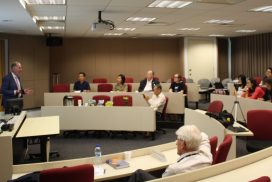Venue
Start
End
Speaker(s)/Moderator(s)
Downloads
Ecosystem-based management, marine restoration and a new biodiversity legal instrument for areas beyond national jurisdiction: Reflections on the European Union MERCES and ATLAS Projects
Introduction

The paper reviews progress in the negotiation of a new international instrument on the protection of biodiversity in areas beyond national jurisdiction in the context of marine ecological restoration, the ecosystem approach and area based management tools in the form of maritime spatial planning. In order to give additional context, the paper provides a brief overview of two European Union interdisciplinary projects that are currently underway: (i) the MERCES project, which examines the scientific and legal basis to restore degraded and/or damaged marine ecosystems and habitats and the services they provide in European regional seas; and (ii) the ATLAS project, which creates a dynamic new research partnership between academic institutions and industry with a view to preparing a trans-Atlantic assessment and deep-water ecosystem-based spatial management plan for Europe, taking into account the exploration and commercial exploitation of deep-sea ecosystems and marine genetic resources balanced with the need for conservation of biodiversity in a changing ocean.
Against the background of case law from the Court of Justice of the European Union and the European secondary legislation, the paper advances two arguments. First, in addition to the conservation and sustainable use of biodiversity, the architecture of the implementation agreement on biodiversity should be designed with a view to preventing, protecting and restoring marine ecosystems and the productivity of the ocean in the interest of the common good. Second, the negotiations should also take into consideration how best to incorporate into the biodiversity instrument new spatial management tools to protect deep-ocean ecosystems with the ultimate aim of improving ocean governance in the Atlantic and elsewhere.
About the Speaker

Ronan LONG
Nippon Foundation Chair
Ocean Governance and the Law of the Sea
World Maritime University
Malmö, Sweden
Ronán Long holds the Nippon Foundation Professorial Chair in Ocean Governance and the Law of the Sea at the World Maritime University in Sweden. Previously, he held the Jean Monnet Chair of European Law and a Personal Professorship at the School of Law at the National University of Ireland Galway. He is the author/co-editor of 9 books and over 100 scholarly articles on oceans law and policy. He worked previously for the European Commission and the Naval Service in Ireland. He has been a Senior Distinguished Visiting Scholar-in-Residence at the Law of the Sea Institute, Berkeley and a Visiting Scholar at the Center Oceans Law and Policy at University of Virginia. Over the past two decades, he has participated as both a member and adviser of the European Union delegation at numerous international negotiations on the codification and development of international law of the sea. His current research interests are in the fields of protecting marine biodiversity in areas beyond national jurisdiction, the legal basis for marine ecological restoration, maritime security law, as well as human rights as they apply to activities that take place at sea. He is a research leader in the European Union Horizon 2020 research projects and co-leader of governance work package in MERCES and a participant in ATLAS. Ronán is a keen sailor and has represented Ireland at the top competitive level in ocean racing.

